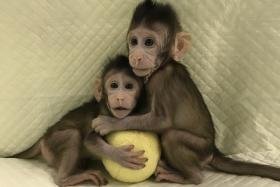Few weeks ago, the news of Chinese scientists successfully cloning the first primate using the same technique that was used to clone Dolly the sheep two decades ago was all over journals and media everywhere around the world.
While these was seen as a breakthrough for some groups of people, critics raised ethical concerns as these could open doors to the cloning of humans in the near future.

Aren't they adorable
Zhong zhong and Hua Hua identical macaques were born through a process known as somatic cell nuclear transfer (SCNT). This process involves removing the nucleus from the egg cell of one individual, and replacing it with the nucleus of a differentiated body cell from another individual. The reconstructed egg, which is implanted into a third individual, develops into a clone of the individual that donated the replacement nucleus.
Until the most recent breakthrough, every attempt to clone primates with SCNT had failed. The new advancement in the medical tech world has brought the feasibility of cloning right to the doorsteps of our very own specie leading us to ask the big question. Are we next?
Muming Poo, who helped supervise the program at the institute, told reporters in a conference call.
“Humans are primates. So for the cloning of primate species, including humans, the technical barrier is now broken,”
ANSWERS
Fortunately the scientists involved in the cloning come from strictly medical perspective and have declared no intentions of considering humans for cloning
The scientists who worked on the project have pointed out that their study will provide a framework for understanding human diseases and although their work could theoretically lead to the cloning of humans, they are only interested in advancing in the treatment of brain disease such as Alzheimer and autism.

Image source
“Just like nuclear power and artificial intelligence, cloning technology is also a double-edged sword,” said Dr Qiang Sun, the director of the Suzhou Nonhuman Primate Research Facility and leader of the study.
Other scientists also declared their view on the subject noting the medical advantages of performing this kind of research on animals that are so evolutionarily close to humans, but stated that human cloning remains a bad idea.
this post is perfect.. thank you for this information and post..
Downvoting a post can decrease pending rewards and make it less visible. Common reasons:
Submit
Going down the slippery slope....
Downvoting a post can decrease pending rewards and make it less visible. Common reasons:
Submit
Yeah. The slope of clones
Downvoting a post can decrease pending rewards and make it less visible. Common reasons:
Submit
Must we clone to treat diseases
Downvoting a post can decrease pending rewards and make it less visible. Common reasons:
Submit
It's hard
Downvoting a post can decrease pending rewards and make it less visible. Common reasons:
Submit
Congratulations @itorokoffi! You have completed some achievement on Steemit and have been rewarded with new badge(s) :
Click on any badge to view your own Board of Honor on SteemitBoard.
For more information about SteemitBoard, click here
If you no longer want to receive notifications, reply to this comment with the word
STOPDownvoting a post can decrease pending rewards and make it less visible. Common reasons:
Submit
@itorokoffi... How will monami monkey look like sef...
Downvoting a post can decrease pending rewards and make it less visible. Common reasons:
Submit
i should be asking be asking you o
#Cameragod
Downvoting a post can decrease pending rewards and make it less visible. Common reasons:
Submit
You sef ehnn kof kof
Downvoting a post can decrease pending rewards and make it less visible. Common reasons:
Submit
you're making steemit a great community with your content itorokoffi! keep it up!
Downvoting a post can decrease pending rewards and make it less visible. Common reasons:
Submit